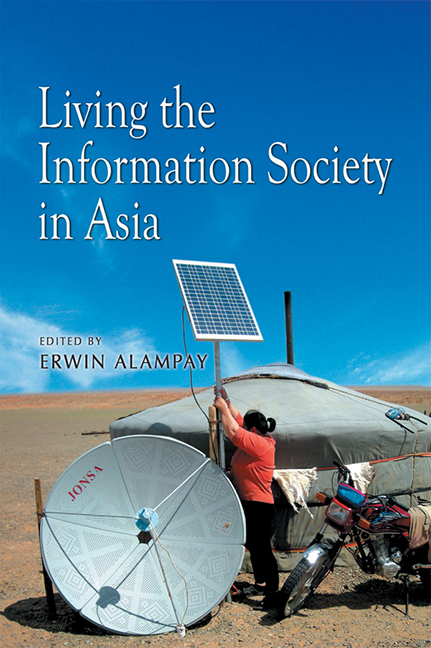Book contents
- Frontmatter
- Contents
- Foreword
- Preface
- List of Abbreviations
- Contributors
- Introduction: Perspectives of ICT Research in Asia
- 1 What Would Durkheim Have Thought? Living in (and with) the Information Society
- 2 What Is a Mobile Phone Relationship?
- 3 Technologies of Transformation: The End of the Social or the Birth of the Cyber Network?
- 4 Becoming Mobile in Contemporary Urban China: How Increasing ICT Usage Is Reformulating the Spatial Dimension of Sociability
- 5 Mobile Religiosity in Indonesia: Mobilized Islam, Islamized Mobility and the Potential of Islamic Techno Nationalism
- 6 Moral Panics and Mobile Phones: The Cultural Politics of New Media Modernity in India
- 7 Stories from e-Bario
- 8 Life and Death in the Chinese Informational City: The Challenges of Working-Class ICTs and the Information Have-less
- 9 Institutional Responses to GIS Adoption for RPTA in Local Governments
- 10 Customer Acquisition among Small and Informal Businesses in Urban India: Comparing Face-to-Face and Mediated Channels
- 11 The View from the Other Side: The Impact of Business Process Outsourcing on the Well-being and Identity of Filipino Call Centre Workers
- 12 Empowering Thai Homeworkers through ICTs
- Index
11 - The View from the Other Side: The Impact of Business Process Outsourcing on the Well-being and Identity of Filipino Call Centre Workers
Published online by Cambridge University Press: 21 October 2015
- Frontmatter
- Contents
- Foreword
- Preface
- List of Abbreviations
- Contributors
- Introduction: Perspectives of ICT Research in Asia
- 1 What Would Durkheim Have Thought? Living in (and with) the Information Society
- 2 What Is a Mobile Phone Relationship?
- 3 Technologies of Transformation: The End of the Social or the Birth of the Cyber Network?
- 4 Becoming Mobile in Contemporary Urban China: How Increasing ICT Usage Is Reformulating the Spatial Dimension of Sociability
- 5 Mobile Religiosity in Indonesia: Mobilized Islam, Islamized Mobility and the Potential of Islamic Techno Nationalism
- 6 Moral Panics and Mobile Phones: The Cultural Politics of New Media Modernity in India
- 7 Stories from e-Bario
- 8 Life and Death in the Chinese Informational City: The Challenges of Working-Class ICTs and the Information Have-less
- 9 Institutional Responses to GIS Adoption for RPTA in Local Governments
- 10 Customer Acquisition among Small and Informal Businesses in Urban India: Comparing Face-to-Face and Mediated Channels
- 11 The View from the Other Side: The Impact of Business Process Outsourcing on the Well-being and Identity of Filipino Call Centre Workers
- 12 Empowering Thai Homeworkers through ICTs
- Index
Summary
Just as technology has revolutionized the social fabric and quality of our lives, so has it created radical changes in the structures, systems, and culture of work. Tavistock's Socio-technical Systems theory suggests that an organization's technology and social systems are intertwined. The challenge for organizations and its leaders is to make sure that man and machine are complimentary and there is a balance in desired outcomes. On the one hand, technologies are typically harnessed to achieve greater productivity. At the same time, however, the technologies an organization uses should enhance, and not diminish, the wellbeing of individuals (Cooper and Foster 1971). This challenge has become all the more important given the increasing role of technology in organizations.
Organizations vary in their application of ICT. At the most basic level, ICTs are used merely as supplement work processes and transactions such as when a computer is used to generate a report. At the other end of the spectrum, technology shapes work processes and structures. This is best exemplified in business process outsourcing (BPO).
Information and communication technology has allowed the transfer of work activities to other organizations and countries who can provide the service at lower costs and/or with better efficiency. Although BPO can take many forms, the biggest chunk of outsourcing comes from call centres.
A call centre combines a human agent with computer and telephone-based technologies to enable efficient customer interaction. Supported by computer systems, customer service representatives (CSRs) interact with clients over the telephone in either responding to queries, complaints or orders (inbound calls), or in soliciting sales or information (outbound calls). The services provided by call centres are wide and range from telemarketing, advisory services, credit collections, handling requests, complaints, sales, billing, transcriptions, technical helpdesks to order-taking (Hewitt 2005). Customer service representatives typically attend to between 60 to 250 clients per eight-hour shift (Dieckhoff, Freigang- Bauer, Schroter, and Viereck as cited by Zapf et al. 2003). How does such technology impact on the job design of CSRs? Call centre work has been characterized as having poor decision latitude, low complexity, and high division of work (Zapf et al. 2003). To ensure efficiency, CSRs are given rules, for example, the average handling time of customers should not exceed five minutes.
- Type
- Chapter
- Information
- Living the Information Society in Asia , pp. 209 - 226Publisher: ISEAS–Yusof Ishak InstitutePrint publication year: 2009



